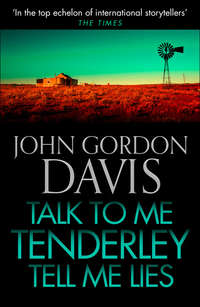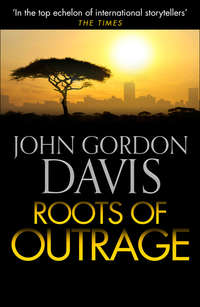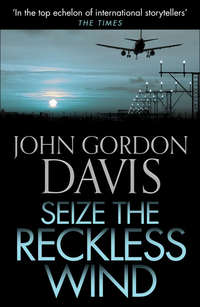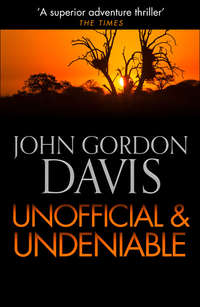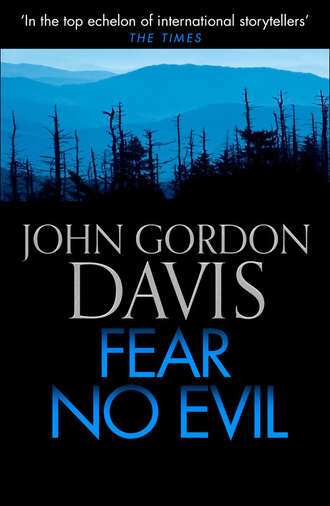
Полная версия
Fear No Evil
The blast of it split the morning like an express train, and his truck leaped forward, roaring down the highway again, blasting straight at the barrier.
Shocked policemen were scattering and waving and shouting, and Davey kept his foot down flat and his hand on the horn—roaring and blasting straight at the barrier, his headlights blazing, and Big Charlie roaring along behind him. Davey gripped his wheel, white-knuckled, his face ashen, his eyes wide and his teeth clenched. All he could see was that red and white barrier hurtling nearer and nearer, forty yards, then thirty, then twenty, filling his vision—and then he hit it.
With a crack like a cannon above the blasting of the horn, the barrier burst and flew like grapeshot, big shattered timbers flying high and wide into the Tennessee morning; Big Charlie’s truck hurtled through after him, leaving shocked policemen scrambling for their cars.
A quarter mile ahead was a turnoff to the town of Erwin and the Appalachian Mountains. Desperately Davey Jordan swung his truckload of elephants onto it.
seven
He kept his hand on the horn, tearing through the town like a locomotive—houses flashing by, people and dogs and cars scattering. Ahead was an intersection, the traffic light green. He heaved the wheel and swung into Main Street, the whole massive truck keeling over.
He roared up Main Street, leaning on his horn, storefronts flying past, cars screeching and dodging, people scrambling and staring and yelling, and Big Charlie right behind him. Two hundred yards behind came the first of the police cars, lights flashing and sirens screaming.
The two trucks went hurtling through Erwin, heading flat out for the Appalachian Mountains, with the police cars wailing behind them. Ahead was another intersection, lights yellow. Davey roared across it. At the next one the light was red and he kept his foot flat, his hand on the horn. A car squealed to a wild halt halfway across; Davey swung his wheel desperately and the truck hurtled through, Big Charlie still behind him. The first police car was almost level with Charlie now, siren screaming and a cop yelling out the window brandishing his gun, and Charlie just kept going. The car overtook Charlie’s truck and went wailing on after Davey on the wrong side of the road, and now the second police car was screaming up on Charlie’s flank.
The first car was drawing wildly alongside Davey, the cop yelling, ‘Pull over or I shoot!’ Davey jerked down behind the wheel and kept on going. Two hundred yards ahead was the turnoff to the mountains, and he headed for it, hunched over his wheel. The police car swung howling in front of his fender; there was a deafening crash of metal, and sparks flew. The truck jolted, and the police car bounced off, tires screeching and cops yelling. Davey kept his foot flat and swung into the intersection. His huge truck swayed and the police car swerved out of his thundering way, going into a wild skid. Big Charlie thundered across the intersection also, and the second police car crashed into his side, banging and bouncing off, then the driver swerved to avoid the first police car skidding toward him, and they crashed into each other. Sideways on, with a wrench of metal and screaming sirens, the two massive trucks roared into the suburbs of Erwin.
They hurtled along, horns blasting, hedges and fences and gardens and churches flashing by, dogs and cats scattering and astonished housewives clutching laundry, groceries and children. Back at the intersection the two police cars disentangled themselves and went racing furiously after them again, battered and howling. The two massive trucks full of animals hurtled past drive-in banks, and supermarkets and restaurants, laundromats and gas stations, heading for the Appalachian Mountains. Then one of the police cars was drawing alongside Davey’s cab again, and he ducked, his foot flat, his horn still sounding. There was a jolt and a screech, and the police car bounced wildly off his fender. The driver bellowed and swung the screaming car back at the truck. There was another crash above the siren; in the second car the cop was shouting into his radio ‘Pete’s jus’ bouncin’ off—there he goes again—these bastards’re too big to head off—Now he’s goin’ to shoot—’ And there was the cracking of gunfire above the wailing, and the bullets went ricocheting off Davey’s heavy-duty tires; fifty yards back the second car’s windscreen suddenly shattered like a spider web, and the car skidded to a stop against the curb.
The front car swung back toward Davey’s truck. There was a wrenching crash, its front wheel wobbled, and the car went into another skid. It skewed wildly across the road; then it nose-dived into the picket fence of the No-tell Motel Drive-in ‘n’ Nite-Club.
Elizabeth Johnson slammed down the telephone in her office, grabbed her medical bag, and dashed out. She scrambled into her Volkswagon. She drove fast out of the zoo grounds, heading for the airport in New Jersey.
eight
Up in the Appalachians, a few miles from Erwin, there is a disused bridge across the Nolichucky River. It is one lane only, over the sheer cliffs of the gorge, which drops to the river below.
David Jordan roared his truck up the crest, then brought it to a hissing halt. He shoved her into reverse, and the huge truck swung backward off the highway, down onto the bridge. He leaped out of his cab, ran to the back, wrenched out the bolts and dropped the big tailboards. There stood the elephants and Sally, jam-packed, blinking at him.
He gave an imperative whistle. Rajah squeezed himself around and started uncertainly toward him, shoving past the hippopotamus.
It only took two minutes to get them all down the tailboards and onto the narrow, old bridge. Davey climbed back into his cab feverishly, and drove his vehicle out of the way, to allow Big Charlie to reverse his truck into the same position.
Five minutes later all the animals were on the bridge. The big bewildered elephants, the wide-eyed lions and tigers, the bears, the gorillas and Sally, blinking and frightened. Davey ran to the other end of the bridge and whistled, and Big Charlie began to shoo them from behind. The circus elephants began to lumber after Davey, then the bears and circus lions, then the others followed. Across the bridge they went, then they were scrambling up the steep dirt track into the Appalachian Mountains, Davey in front with Champ the Chimpanzee beside him, and Big Charlie and the wolf-dog, Sam, bringing up the rear.
For the first two miles they ran uphill, into forests of pine and laurel, the long line of animals huffing and panting, their nostrils dilated at all the smells, adrenalin pumping, flanks heaving. Davey ran, his knapsack bouncing, his heart pounding with exhaustion, his eyes bright with fury that this had happened, just one hundred miles from the Smokies—just two more hours in those trucks. He ran and ran, following the narrow dirt path that was the Appalachian Trail, looking over his shoulder, gasping at the animals to follow, but they were right behind him: the chimpanzee galloping hard on his heels; and Mama the zoo tiger; then Rajah and the circus elephants, trunks swinging; then the zoo elephants and the performing bears and, at the rear, Sally the hippopotamus, wheezing. Davey knew they would follow him, and anyway Big Charlie was herding them and Sam would bring back any that scattered off the trail. He kept glancing back only to urge them to hurry, desperately putting as much distance as possible between them and the abandoned trucks. He ran and he ran, then at last he slowed to a rasping jog.
He shuffled along the crest, his arms hanging loose, his heart thumping against his chest. He knew that a few miles ahead, near No Business Knob, there was a spring. About a mile beyond that, a creek. The animals needed water. But the spring was too small; it would take too long; they needed the creek … and he had not brought the pig’s carcass for the lions. Nor did he have a rifle.
‘But ole Professor Ford’s right,’ Frank I. Hunt drawled, eyes closed. ‘I’m not an expert.’ His makeup girl was putting the finishing touches to his tan.
‘But to them you are,’ Charles Worthy said. He jabbed his finger downstairs at the Hilton Hotel lobby. ‘You’re the big lion tamer to them, and don’t you forget it, Morris.’
‘And don’t call me Morris,’ Frank sighed.
‘And those grizzly bears, everybody’s scared of grizzly bears. Even those elephants are dangerous—that’s what you got to tell them. And you’re going to get them back.’
‘Sure,’ Frank said.
‘You know much more about those animals than that Professor Ford—’ He jerked his thumb at the television screen. He tossed his showman’s head: ‘“I am unaware that circus personnel are experts …” Well, I tell you something you’re going to make him aware of. He just keeps animals like museum pieces for people to ogle at. But we—we bring the animals to the people! We bring knowledge of animals. Entertainment. Happiness. Most kids in this world would never see an elephant or a lion unless we brought them to their town. And we’re proud of that! Zoo?—they just keep animals in cages. Us?—we go into the cages!’
‘Sure,’ Frank Hunt said wearily.
‘Are you listening, Frank? We’re not going to take that insult from Ford lying down!’
‘Certainly not.’
‘And something else Ford’s unaware of,’ the old man said vehemently. ‘He’s not going to steal the show, Morris! Hell, they’re mostly our animals that’s been stolen, our trucks, our gear thrown all over the zoo, our circus that can’t go on! What’s he lost? One tiger and a coupla gorillas and three or four elephants, and bet they’re all as miserable-looking as he is.’
‘Actually,’ the makeup girl said, ‘I thought he was kind of cute. All serious and cuddly.’
‘Whereas you?—you’re photogenic, Morris. You go into that ring, and you knock all the ladies dead. And the kids love you, you make everybody happy. And you’re the expert. I’m not saying you must go down there to those television cameras and cash in on what’s happened … That wouldn’t be … in keeping with our proud tradition. All I’m saying is … there’s going to be an awful lot of publicity—and if it rightfully belongs to anybody it belongs to us—not to Professor Ford, Morris … This is very important to put across Morris!’
‘Morris isn’t a very photogenic name. Try Frank I. Hunt.’
‘What’s the I supposed to stand for?’ the girl asked.
‘Ignatius,’ Frank said.
‘Ivan,’ Worthy said testily. ‘Can’t you take anything seriously? Listen, Frank—you don’t seem to realise what this means. The whole world’s watching, Frank! We’re going to hold their attention for weeks while those animals are recaptured. And you, sir, are going to be a national figure—the guy who goes into the cages, remember that!’
‘It’s getting the animals back into the cages that I’m not wild about.’ Frank looked at himself in the mirror. ‘Am I or am I not,’ he said, ‘a dead ringer for Tony Curtis?’ He blew himself a kiss. ‘Or Dean Martin?’ he added reasonably.
‘Be serious for once!’
‘Serious? …’ He reached for the bourbon and sloshed some into his glass. ‘I am deadly serious, Chuck. I an not a big white hunter. Never have been, you know. Ringmaster, that’s me.’
‘You’re not a comedian either!’
‘Comedian?’ Frank mused. ‘Maybe that’s what I should have been. Or an escape artist.’
‘You don’t even care that we’ve lost our animals! Even if they’re shot!’
Suddenly Frank Hunt looked serious. ‘Is that so?’ He took another big slug of his whiskey. ‘Well, I’m here to tell you’—he jabbed a finger—‘that I do care.’ He jabbed his finger again. ‘I want all those big cats safely back in their cages! And that tiger. Because I, Chuck,’ he tapped his chest, ‘trained the bastards. I, as you so correctly pointed out, go into the cages! Not you—me. And I don’t want to start all over again with new sonsabitches who want to eat me for breakfast every goddam morning!’
He shucked on the jacket of his white safari suit, then clapped on his leopard-skin-banded hat at a rakish angle.
‘You know why I’m so happy? Because I’m not going into the ring with those cats tomorrow.’ He turned to the girl and said pensively, ‘Maybe I should have been the Human Cannonball?’
Then he opened the door with a flourish and strode down the carpeted corridor to the elevator, Worthy hurrying behind him. He stabbed the elevator button and waited jauntily. The doors opened on an elevator full of people standing solemnly. Frank gave them a businesslike smile and intoned, ‘I suppose you’re wondering why I called you all together? …’
nine
‘Why not?’ Dr. Elizabeth Johnson demanded indignantly.
‘Because, ma’am,’ the air-hostess smiled, ‘we’re not allowed to serve alcohol over the Bible Belt.’
‘But we’re twenty thousand feet up!’
‘In the Bible Belt it’s dry all the way up to heaven, ma’am.’
‘Good God …’
Then that gave her something new to worry about: the Bible Belt. She had heard about this funny country down here in the South, its hillbilly brethren who thought the world was flat. Didn’t they have people up in these hills who still spoke Elizabethan English? Backwoods people like those in that movie Deliverance … God … What would people like that do to jungle animals let loose in their mountains? Not counting American hysteria, and the great American hunters she’d read about, who were going to descend with a whoop and a holler on the sudden bonanza of exotic targets to blood their mail-order guns on. Oh, God, the hue and cry that was coming, and the bloodbath … And a lot of policemen in this country were supposed to be trigger-happy. And who was going to be masterminding the recapture operation? Dear old Jonas Ford. …
She closed her eyes. That in itself was enough to make her need a drink.
That was unjust of her. Jonas was a fine zoologist, one of the world’s best. A good administrator, too. Maybe he could handle this crisis, maybe he was just the man. Maybe he’d get in there and mastermind the whole thing as magnificently as he performed post mortems.
She lit a cigarette and blew the smoke out hard.
She wished she could believe it. Dear Jonas … fine Jonas … honorable Jonas … distinguished and successful Jonas. And even—for the right girl, one day—lovable Jonas. But, oh, dear me. …
She sighed out smoke. Heavens, he treated life—people—as he treated his animals. ‘Exhibits.’ That’s what he called the animals in his zoo. ‘This is a fine exhibit.’ ‘Is this exhibit sick?’ ‘What about the female adult exhibit?’ And that’s how he treated people in his earnest, uptight way. That’s how he had treated that press interview and put everybody’s back up—didn’t he realize that this was also an emotional crisis, that not everybody approved of zoos, that the cages were too small, that the zoo was going to come in for a lot of criticism? Didn’t he realize the crying need right this moment to appeal for calm and goodwill? To make the public feel love for the animals, so they’ll cry out for restraint … She felt the dread and impotence well up again, and closed her eyes. Keep thinking about fonas …
She had caught Jonas’s television interview in the transit lounge in Cook’s County airport (where she could have got a drink if only she’d known about the Bible Belt lurking ahead, zapping its deadly laws up into the stratosphere). And oh, dear, Jonas meeting the press on television about this terrible thing, this insanity committed against her poor animals … He had spoken as if the reporters’ questions were a personal affront.
She sighed. And, yes, she felt sorry for herself. Because until she saw him on television she had begun to think—hope?—that something could come of it between them. For an instant she had even felt proud when she saw him striding so authoritatively into the press conference—but as soon as he began to speak with his serious-scientist authority …
She exhaled smoke. No … Jonas and she just weren’t meant for each other by dear old Mother Nature. In that instant she had glimpsed all the things about him that gave her the willies. Jonas and his half bottle of California wine. His nervous expression when she consulted the menu, in case she chose anything too expensive. Jonas opening windows when she lit a cigarette. Jonas inspecting the cutlery for stains. Jonas and his sudden bumbling ardor every time he tried to make love to her. Jonas jumping up afterward to wash his hands. Jonas and his determined dignity. Jonas and his bloody tactlessness—‘You drink too much, my dear, that’s why you’re putting on weight.’ ‘You smoke too much, my dear, you’re losing your complexion.’ Just the thing a girl likes to hear.
She smiled wearily. Dear Jonas … Good man. Good scientist. Well-off, bachelor, social standing. But she had been a fool even to try to make a go of it. She should have kept the relationship on its original level—intellectual; just somebody nice to talk music and poetry and books and films with—somebody nice and safe. But no. She had been trying pathetically to put her life back together ever since the Big Heel suddenly had kicked her out. It had been very nice, after her dismal failures in the singles bars (Oh God how dismal), after her pathetic efforts at being with-it—a shrinking violet on the meat market—to be wooed by her new prestigious boss, very nice to write home to England, so that the Big Heel would hear about it, that she was having a ball in the Big Apple of New York and having a wild affair with one of the world’s leading professors of zoology—how would his blonde Singapore dumbbell look then?
Then she sighed at herself scornfully. But bitterly all the same. Because Bernard wouldn’t care. And the sad fact was that she shouldn’t care either! A whole bloody year—she should be over it by now!
Enough! She felt the tears burn, and she got up impulsively to stop herself thinking. She hurried down the aisle to the toilet, trying to compose herself. She locked the door and slumped against it.
She sighed deeply. There were a few other hard facts to face.
And one was that she dreaded ever having to show herself to him now—to have herself compared to the blonde from Singapore. Because she was too fat now, just as Jonas said. She was a godawful mess! Look at you! And even your panties back to front still!
She unzippered her jeans, kicked off her shoes. She pulled the jeans down over her hips, wrestled them down over her thighs. So tight! Two sizes bigger than last year! She sat down on the toilet and struggled out of them. She pulled off the offending panties, then made herself look in the mirror.
God, she looked dreadful. And she wasn’t talking about her distress, her red eyes and her hair all over the place. She stood there naked from the waist down, twenty thousand feet above the Bible Belt. Plump thighs—and she used to have good legs. Look at your hips. Dimpled bottom. Even her shoulders were chubby. She had put on so much weight that her bust looked smaller, though it wasn’t. She used to have almost classic high cheekbones. Now? A year ago she was positively thin after eating her heart out for two awful months in their heartbreakingly empty house in London hoping Bernard would return to his senses and come back to her. ‘I’m afraid I’ve fallen in love,’ he had announced on the telephone from the airport, ‘I’m not coming home.’ A few stop-overs in Singapore, and he’d fallen in love—prepared to kick over five years for some peroxide blonde he’d met in the Shangri-La Hotel. And now what she had done to herself—overweight and a smoker’s cough!
She closed her eyes. This was ridiculous …
She looked ridiculous, standing there. She pulled on her panties, then her jeans. Ridiculous, bare-assed over the Bible Belt feeling sorry for herself. She jammed on her shoes. She peered into the mirror to patch herself up, then sighed. She’d left her bag on her seat; she didn’t have her makeup.
Oh, what the hell! Why should she care what she looked like, nobody else did. Except dear old Jonas Ford. She didn’t care if she was too fat, if she ate too much, and if a few whiskys and a bottle of wine every evening were making her fat, to hell with it—what else was there to look forward to in her crummy apartment at the end of a day? She did not care any more.
Then she looked at herself grimly.
Well—that was wrong. She was going to start caring again, from now on. She was going to stop feeling sorry for herself. So, her husband had jilted her. Big deal—it had happened to millions of other people. Think positively ...
She ran her fingers through her hair, bit her lips to get some color into them, then opened the door. She returned to her seat, collected her handbag and walked back to the toilet.
She brushed her hair vigorously. She powdered her nose and put on her lipstick.
There … she looked much better. Her hair was still good—wavy and shiny and a lovely chestnut. And her green eyes were still beautiful. And her mouth. In fact, she had a lovely face—you could still see that. She was going to get herself back into shape. Think positively. So she could stand comparison with the Singapore blonde.
She returned to her seat and stared out of the window.
And her heart sank again as she looked down at those mauve Appalachian Mountains. Oh, how vast. They just went on and on forever. How on earth were they going to get those animals out of there? It was going to take a massive military-style operation just to contain the animals in any given chunk of it, let alone get in there and find them, track them one by one. Then get them out … No roads and that massive, steep, rugged, timber country.
Then she thought of her dear animals loose, frightened, bewildered, lost, their beautiful eyes darting fearfully in all directions and their hearts hammering, crouched in hiding and slinking about, terrified of every rustle of leaves and snap of a twig, desperately looking for food and not finding any, getting hungrier and hungrier, not understanding what had happened to them, getting thinner and thinner and wild with fear—and not understanding. Defenseless. And her heart surged in impotent anger at David Jordan.
She did not know what good she was going to do, impulsively jumping on a plane like this and getting down here. Bernard had always accused her of impetuosity. Too easily steamed up. ‘Drama, Liz—you’re a sucker for drama.’ But she knew she just had to—she just had to try, somehow try, to get in there and do something. Be available, to help, to try to prevent. To … succor. …
ten
A creek ran down a ravine, through thick hemlock and laurel, disappearing into tangled green and dappled shadows. The animals were invisible from the Appalachian Trail, fifty yards up on the crest. A man loses sight of another within twenty paces in those forests.
It was early afternoon. The animals clustered around the little creek, waiting for Jamba, the old zoo elephant, who was still drinking. David squatted on the bank, sweat shining on his forehead, eating a bar of chocolate, his eyes restlessly darting over the animals, constantly looking in the direction of the Appalachian Trail.
Champ sat on one side of him, Sam in front, ears cocked, tongue slopping, his wolf eyes riveted on every movement of the chocolate from hand to mouth. Davey’s face softened and he fondled the dog’s head. Sam thumped his tail once, then he was all eyes for the chocolate again. Davey broke off a piece and tossed it to him. Sam snapped it up in midair, gulped it down, then was all rapt attention again.





